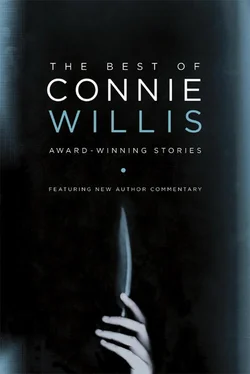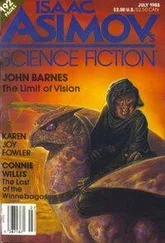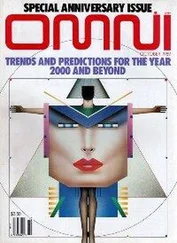But in the morning, as I was leaving, she said, “Sara called and canceled while you were in the shower.”
“They can’t go to the play with us Saturday?”
“No,” Cath said. “She isn’t going shopping with me today. She said she had a headache.”
“She must have drunk some of that awful sherry,” I said. “So what are you going to do? Do you want to come have lunch with me?”
“I think it’s someone at the conference.”
“Who?” I said, lost.
“The man Sara’s having an affair with,” she said, picking up her guidebook. “If it was someone who lived here, she wouldn’t risk seeing him while we’re here.”
“She’s not having an affair,” I said. “I saw her. I saw Elliott. He—”
“Elliott doesn’t know.” She jammed the guidebook savagely into her bag. “Men never notice anything.”
She began stuffing things into her bag—her sunglasses, her umbrella. “We’re having dinner with the Hugheses tonight at seven. I’ll meet you back here at five-thirty.” She picked up her umbrella.
“You’re wrong,” I said. “They’ve been married longer than we have. She’s crazy about Elliott. Why would somebody with that much to lose risk it all by having an affair?”
She turned and looked at me, still holding the umbrella. “I don’t know,” she said bleakly.
“Look,” I said, suddenly sorry for her, “why don’t you come and have lunch with the Old Man and me? He’ll probably get us thrown out like he did at that Indian restaurant. It’ll be fun.”
She shook her head. “You and Arthur will want to catch up, and I don’t want to wait on Selfridge’s.” She looked up at me.
“When you see Arthur—” She paused, looking the way she did when she was thinking about Sara.
“You think he’s having an affair, too, oh Madame Knows-All, Sees-All?”
“No,” she said. “He was older than us.”
“Which was why we called him the Old Man,” I said, “and you think he’ll have gotten a cane and grown a long white beard?”
“No,” she said, and slung her bag over her shoulder. “I think if they have my china at Selfridge’s, I’ll buy twelve place settings.”
She was wrong, and I would prove it to her. We would have a great time at the play, and she would realize Sara couldn’t be having an affair. If I could get the tickets. Ragtime had been sold out, which meant The Tempest was likely to be, too, and there weren’t a lot of other choices, since Elliott had said no to Sunset Boulevard . And Cats , I thought, looking at the theater posters as I went down the escalator. And Les Miz .
The Tempest and the Hayley Mills thing, Endgames , were both at theaters close to Leicester Square. If I couldn’t get tickets at either, there was a ticket agent in Lisle Street.
The Tempest was sold out, as I’d expected. I walked over to the Albery.
Endgames had five seats in the third row center of the orchestra. “Great,” I said, and slapped down my American Express, thinking how much things had changed.
In the old days I would have been asking if they didn’t have anything in the sherpa section, seats so steep we had to clutch the arms of our seats to keep from plummeting to our deaths and we had to rent binoculars to even see the stage.
And in the old days, I thought grimly, Cath would have been at my side, making rapid calculations to see if our budget could afford even the cheap seats. And now I was getting tickets in third row center, and not even asking the price, and Cath was on her way to Selfridge’s in a taxi.
The girl handed me the tickets. “What’s the nearest tube station?” I asked.
“Tottenham Court Road,” she said.
I looked at my tube map. I could take the Central Line over to Holborn and then a train straight to South Kensington. “How do I get there?”
She waved an arm full of bracelets vaguely north. “You go up St. Martin’s Lane.”
I went up St. Martin’s Lane, and up Monmouth, and up Mercer and Shaftesbury and New Oxford. There clearly had to be closer stations than Tottenham Court Road, but it was too late to do anything about it now. And I wasn’t about to take a taxi.
It took me half an hour to make the trek, and another ten to reach Holborn, during which I figured out that the Lyric had been less than four blocks from Piccadilly Circus. I’d forgotten how deep the station was, how long the escalators were. They seemed to go down for miles. I rattled down the slatted wooden rungs and down the passage, glancing at my watch as I walked.
Nine-thirty. I’d make it to the conference in plenty of time. I wondered when the Old Man would get there. He had to drive down from Cambridge, I thought, going down a short flight of steps behind a man in a tweed jacket, which was an hour and a—
I was on the bottom step when the wind hit. This time it was not so much a blast as a sensation of a door opening onto a cold room.
A cellar, I thought, groping for the metal railing. No. Colder. Deathly cold. A meat locker. A frozen food storage vault. With a sharp, unpleasant chemical edge, like disinfectant. A sickening smell.
No, not a refrigerated vault, I thought, a biology lab, and recognized the smell as formaldehyde. And something under it. I shut my mouth, held my breath, but the sweet, sickening stench was already in my nostrils, in my throat. Not a biology lab, I thought in horror. A charnel house.
It was over, the door shutting as suddenly as it had opened, but the bite of the icy air was still in my nostrils, the nasty taste of formaldehyde still in my mouth. Of corruption and death and decay.
I stood there on the bottom step taking shallow, swallowing breaths, while people walked around me. I could see the man in the tweed jacket, rounding the corner in the passage ahead. He must have felt it, I thought. He was right in front of me. I started after him, dodging around a pair of children, an Indian woman in a sari, a housewife with a string bag, finally catching up to him as he turned out onto the crowded platform.
“Did you feel that wind?” I asked, taking hold of his sleeve. “Just now, in the tunnel?”
He looked alarmed, and then, as I spoke, tolerant. “You’re from the States, aren’t you? There’s always a slight rush of air as a train enters one of the tunnels. It’s perfectly ordinary. Nothing to be alarmed about.” He looked pointedly at my hand on his sleeve.
“But this one was ice-cold,” I persisted. “It—”
“Ah, yes, well, we’re very near the river here,” he said, looking less tolerant. “If you’ll excuse me.” He freed his arm. “Have a pleasant holiday,” he said and walked away through the crowd to the farthest end of the platform.
I let him go. He clearly hadn’t felt it. But he had to, I thought. He was right in front of me.
Unless it wasn’t real, and I was experiencing some bizarre form of hallucination.
“Finally,” a woman said, looking down the track, and I saw a train was approaching. Wind fluttered a flyer stuck on the wall and then the blond hair of the woman standing closest to the edge. She turned unconcernedly toward the man next to her, saying something to him, shifting the leather strap of her bag on her shoulder.
It hit again, an onslaught of cold and chemicals and corruption, a stench of decay.
He has to have felt that, I thought, looking down the platform, but he was unconcernedly boarding the train, the tourists next to him were looking up at the train and back down at their tube maps, unaware.
They have to have felt it, I thought, and saw the elderly black man. He was halfway down the platform, wearing a plaid jacket. He shuddered as the wind hit, and then hunched his gray grizzled head into his shoulders like a turtle withdrawing into its shell.
Читать дальше












